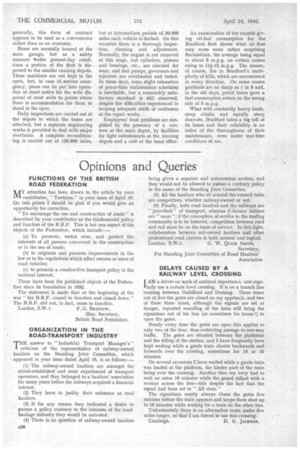Opinions and Queries
Page 28

If you've noticed an error in this article please click here to report it so we can fix it.
FUNCTIONS OF THE BRITISH ROAD FEDERATION MY attention. has been drawn to the article by your contributor, "Tantalus," in your issue of April 10. On two points I should be glad if you would give an opportunity for correction.
'To encourage the use and construction of roads" is described by your contributor as the fundamental policy and function of the B.R.F. This is but one aspect of the objects of the Federation, which include :— (a) To promote, watch over, and protect the interests of all persons concerned in the construction or in the use of roads; (b) to originate and promote improvements in the law or in the regulations which affect owners or users of road vehicles; (c) to promote a constructive transport policy in the national interest.
These have been the published objects of the Federation since its foundation in 1932.
The statement is made that at the beginning of the war "the B.R.F. ceased to function and closed down." The B.R.F. did not, in fact, cease to function.
London, S.W.1. F. G. BRISTOW,
Hon. Secretary, British Road Federation.
ORGANIZATION IN THE ROAD-TRANSPORT INDUSTRY THE answer to "Industrial Transport Manager's" criticism of the representation of railway-owned hauliers on the Standing Joint Committee, which appeared in your issue dated April 10, is as follows — (1) The railway-owned hauliers are amongst the oldest-established and most experienced of transport operators, and they belonged to a hauliers' association for many years before the railways acquired a financial interest.
(2) They have to justify their existence as road hauliers.
(3) If for any reason they indicated a desire to pursue a policy contrary to the interests of the roadhaulage industry they would be outvoted.
(4) There is:no question of railway-owned hauliers
being given a separate and autonomous section, and they would not be allowed to pus-sue a contrary policy in the name of the Standing Joint Committee.
(5) All the hauliers. who sit around the council table are competitors, whether. railway-owned or not.
(0) Finally, both road hauliers and the railways are " provideri " of transport, whereas C-licence holders are "users"; if the conception of service to the trading community is to be fostered, competition between road and rail must be on the basis of service. In this light, collaboration between rail-owned hauliers and other professional road carriers is both natural and logical.
London, -S.W.1. G. W. QUICK SMITH,
Secretary, For Standing Joint Committee of Road Hauliers' Association DELAYS CAUSED BY A RAILWAY LEVEL CROSSING I AM a driver on work of national importance, and regularly use a certain level crossing. It is on a branch line running between Guildford and Dorking. Three times out of five the gates are closed on my approach, and two of these three times, although the signals are set at danger, repeated sounding of the horn will bring the signalman out of his box (or sometimes his house I) to open the gates. ,
Nearly every time the gates are open this applies to only two of the four, thus restricting passage to one-way traffic. The gates are situated between the platforms and the siding of the station, and I have frequently been kept waiting while a goods train shunts backwards and forwards over the crossing, sometimes for 15 or 241 minutes.
On several occasions I have waited while a goods train, was loaded at the platform, the hinder part of the train being over the crossing. Another time my lorry had to wait an extra 10 minutes while the guard talked with a woman across the line—this despite the fact that the signal had been set to " All clear."
The signalman nearly always closes the gates five minutes before the train appears and keeps them shut up to 10 minutes while waiting for a train on the other line.
Unfortunately there is no alternative route under five miles longer, so that I am forced to use this crossing.
Cranleigh. D. G. JACKSON.




















































